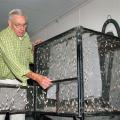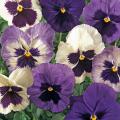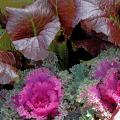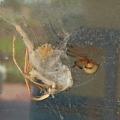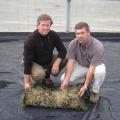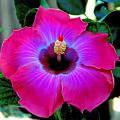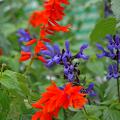News From 2006
MISSISSIPPI STATE -- Universities often offer parenting classes, but Mississippi State University recently held an international workshop focused on rearing the tiniest offspring: insects.
Initiated in 2000, MSU has hosted nine intensive short courses to teach people from all over the world the lessons crucial to rearing insects in a laboratory setting for research and commercial sales. The workshop is the only formal education on insect rearing provided by any university in the world.
By Norman Winter
MSU Horticulturist
Central Mississippi Research & Extension Center
During a recent greenhouse visit, I could pick out my favorite mix of pansies while I was still 30 or 40 yards away. It's been several years since a mix of any certain crop stirred such frenzy in me, but that is precisely what happens every time I look at Coastal Sunrise.
The Coastal Sunrise mix is in the Matrix series. The Matrix series only hit the market last year, and already they have skyrocketed in popularity for several good reasons.
MISSISSIPPI STATE -- A degree program that requires students to spend extensive time on the golf course got an academic boost with the recent donation of a piece of state-of-the-art equipment to evaluate golf swings.
Denver-based GolfTEC Enterprises donated a $22,000 SEVA system in September to Mississippi State University's Professional Golf Management program. GolfTEC founders Joe Assell and Mike Clinton are PGM graduates who are sharing the success of their company with their alma mater.
MISSISSIPPI STATE -- Mississippi sweet potato farmers were not expecting a good crop after this year's drought, but producers are pleasantly surprised as harvest nears completion.
Benny Graves, executive secretary of the Mississippi Sweet Potato Council, said the crop should be fair to good overall. The drought should make the potatoes sweeter than normal.
“We're not going to have a bin-buster because of the drought stress, but quality is good,” Graves said.
By Norman Winter
MSU Horticulturist
Central Mississippi Research & Extension Center
The shopping frenzy for winter plantings has begun, and as you shop for pansies and snapdragons, keep in mind flowering kale, cabbage and mustard.
With their foliage in brilliant shades of lavender, purple, pink, red and white, remember that kales, cabbages and mustards add pizzazz to the fall and winter garden like no other plants can do. This isn't a temporary show either. These tough plants give a “wow-effect” to gardens from October though April.
MISSISSIPPI STATE -- Halloween is supposed to be a night of fun for kids, but it can turn into a night of fright if people aren't cautious.
Thousands of children across Mississippi will be out on Oct. 31 dressed in costumes and going door-to-door in neighborhoods. Others of all ages will take part in parties and festivals designed with a fall flair. Most will have the opportunity to eat a lot of sweets.
MISSISSIPPI STATE -- Fake spiders receive special attention in Halloween decorations, but Mississippi's real spiders are true sources of tricks and treats all year long.
MISSISSIPPI STATE -- Consumers may have trouble scaring up pumpkins for holiday decorations this fall.
David Nagel, horticulturist with Mississippi State University's Extension Service, said most growers whose fields were already dry at planting time chose not to plant any pumpkins this year if they did not have access to irrigation. Some growers with nonirrigated farms took the chance if their fields received some rain around the first of July and now are harvesting significantly reduced yields.
MISSISSIPPI STATE -- John Holmes dreams of one day shipping entire golf courses from Georgia to anywhere in the world. Holmes, global sales manager for Phillip Jennings Turf Farm in Soperton, Ga., may see his dream become a reality thanks to a product developed at Mississippi State University.
The MSU-developed product is a soilless sod that never touches dirt until it is put into place on a lawn, golf course, sports field or other location. It is grown from sprigs using cotton mats and nutrient-enriched water.
By Norman Winter
MSU Horticulturist
Central Mississippi Research & Extension Center
The cooler weather of October means one thing -- it's pansy planting time in the South. I was on the coast the other day and one of the restaurants already had quite a display. There are so many great new selections that you may have a hard time making a decision. That's where I come in, and I want to suggest this fall's Mississippi Medallion Award-winning Ultima Morpho.
MISSISSIPPI STATE -- Sweetgum trees are a common sight in forests across the South, but their usefulness in the lumber industry has been limited.
“The sweetgum tree is a species that is underused,” said Rubin Shmulsky, forest products associate professor in Mississippi State University's Forest and Wildlife Research Center. “Sweetgum lumber is prone to warp and the wood color and grain are erratic, which further limits its use for cabinetry and flooring.”
MISSISSIPPI STATE -- Mississippi poultry companies responded to low broiler prices during the first quarter of 2006 by reducing bird numbers, which may be the reason for slight market improvements in recent months.
Tim Chamblee, poultry specialist with the Mississippi Agricultural and Forestry Experiment Station, said the number of birds slaughtered was down, but third quarter broiler meat production was up less than 1 percent from the year before. He attributed the total weight increase to the trend toward higher live weights.
MISSISSIPPI STATE -- Research is an important part of graduate school, and three students in the Department of Entomology and Plant Pathology at Mississippi State University are receiving significant research scholarships for the current school year.
Master’s degree student David F. McNeill of Louisville, Tenn., has been awarded the L.S. Olive Scholarship of the North Carolina-based Highlands Biological Station. The $2,400 scholarship supports his research into a fungus that attacks American chestnut trees in the Eastern United States.
MISSISSIPPI STATE -- Mississippi manufacturers will learn ways to make their plants more productive and globally competitive at an Oct. 24-25 conference at the Nissan Training Center in Canton.
Sponsored by Mississippi State University’s Industrial Outreach Service and Nissan, the 2006 Lean Manufacturing Conference is designed to help plant managers, owners, executives and engineers who have responsibility for improving manufacturing systems. Successful local production managers and national consultants will conduct the conference sessions.
MISSISSIPPI STATE -- Researchers in three states looking at ways to battle flies in dairy farms have turned to a parasitic wasp for help.
Scott Willard, an associate professor of reproduction and environmental physiology in Mississippi State University's Animal and Dairy Science Department, said the research looks promising. The young of the pteromalid wasps feed on the developing, pupae stage of flies, killing them.
By Norman Winter
MSU Horticulturist
Central Mississippi Research & Extension Center
One of the plants I enjoyed the most on my deck this growing season has been a tropical hibiscus named Rum Runner. It's a large, 8-inch bloomer that has been very popular in Florida, and an Internet search indicates many other gardeners want it, too.
By Chance McDavid
MISSISSIPPI STATE -- There is a program in Mississippi helping high school students answer the question, “Do I want to be a doctor?”
Rural Medical Scholars is a five-week summer program at Mississippi State University offered through the Mississippi Rural Health Corps that gives eligible students an opportunity to gain hands-on experience in medicine. Except for a small registration fee, scholars receive free tuition, textbooks, housing and a food allowance.
MISSISSIPPI STATE -- Peanut yields vary widely from one end of the state to the other as a result of the 2006 drought.
|
|
Mississippi State University Extension Service agronomists anticipate the state average to be near 3,000 pounds per acre, compared to last year's 3,750 pounds. In 2005, Mississippi growers produced the second highest state average in the country.
MISSISSIPPI STATE -- An upcoming workshop will help people address many of the issues related to landscape design.
The 51st Mississippi Landscape Symposium is the longest running workshop of its kind in the country. The symposium will take place from 9 a.m. until 3 p.m. Oct. 18 in the Bost Auditorium at Mississippi State University.
By Norman Winter
MSU Horticulturist
Central Mississippi Research & Extension Center
The term “black and blue” usually refers to the results of someone getting in a fight and not coming out the winner. You might look black and blue after clearing some native jungle for your landscape.
But if you try the plant known as Black and Blue, you will come out the winner, as will the countless hummingbirds that will compete for its nectar.
Pages
News Types
- Crop Report (428)
- Feature Story (5905)
- Feature Photo (53)
- Extension Outdoors (320)
- Southern Gardening (1481)
- Extension Inbox (95)
Archive
- 2025 (98)
- 2024 (186)
- 2023 (182)
- 2022 (183)
- 2021 (176)
- 2020 (211)
- 2019 (222)
- 2018 (276)
- 2017 (336)
- 2016 (381)
- 2015 (456)
- 2014 (495)
- 2013 (487)
- 2012 (491)
- 2011 (354)
- 2010 (320)
- 2009 (313)
- 2008 (272)
- 2007 (263)
- 2006 (252)
- 2005 (278)
- 2004 (270)
- 2003 (279)
- 2002 (227)
- 2001 (238)
- 2000 (241)
- 1999 (231)
- 1998 (231)
- 1997 (239)
- 1996 (58)
- 1995 (36)

